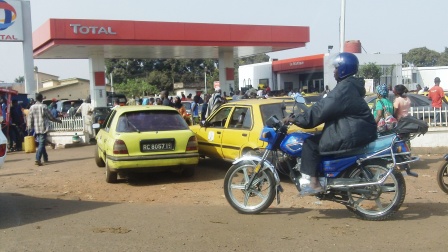
[ad_1]
The Dutch Inspectorate for the Human Environment and Transportation reveals that petroleum giants are exporting oil products to the African continent mixed with chemicals that are hazardous to health.
What a difference between the gasoline you put in your vehicle and the one used by another motorist living 6,000 kilometers from your home in Nigeria? None, would we be tempted to answer. Yet the reality is quite different: fuels for the West African market are made of highly carcinogenic substances, such as manganese and benzene, according to a survey by the Dutch Inspectorate for the Human Environment and Transport (ILT) on the cargoes of 44 tankers bound for West Africa
Almost 400 times more sulfur
The ILT also notes in the fuels destined for West Africa "300 times more sulfur than allowed by European standards". This result is in line with the previous "Dirty Diesel" survey of the Swiss organization Public Eye. Released in September 2016, its report revealed that diesel could contain up to 400 times more sulfur than the accepted content in Europe! "By these illegitimate practices, these companies are contributing to the explosion of air pollution in African cities and harming the health of millions of people," said Public Eye. Air pollution is already a major problem in Africa.
Air pollution in Africa: a time bomb
Air pollution is already a major problem in African cities, which are among the most polluted in the world. Vehicle exhaust is one of the main causes of air pollution to fine particles. Although in Africa, there are fewer cars in circulation than in Europe, pollutant emissions are higher because the fuels used contain more sulfur. The combustion of these toxic fuels releases very large quantities of fine particles. They also hinder the proper functioning of catalysts and particulate filters. The strong air pollution has disastrous consequences for the health of the populations of the regions concerned. Respiratory disease is one of the leading causes of hospital care in Accra, Ghana, says Public Eye. If no measures are taken to reduce the high sulfur content of fuels, air pollution related to road traffic will cause, during the year 2030, the premature death of 31,000 people in Africa, three times more than in Europe, the United States and Japan put together!
Total and Shell cited among the main perpetrators
The Dutch investigation report points out about ten giants of oil brokerage such as the Swiss Vitol and Gunvor, the Anglo-Swiss Glencore or Trafigura. As for the oil companies, the French Total and the Anglo-Dutch Shell are cited as the main responsible blends of petroleum products. Operations sometimes carried out in open sea near African coasts and metropolises such as Dakar in Senegal or Lagos in Nigeria. "If the Netherlands has conducted this investigation to be presented to Parliament at a date still unknown and some cases of illegality could be brought to justice, is that nearly 50% of petroleum products exported to Africa from the West from the ports of Amsterdam and Rotterdam to Antwerp, Belgium, according to the United Nations (UN) ", notes the newspaper Le Monde.
But the countries of West Africa could end this "African quality", as oil brokers say. Like Ghana, which since July 1, 2017, only imports fuels with low sulfur content: 50 parts per million (ppm) maximum, against 3,000 ppm previously (the European standards are set at 10 ppm since 2009) aligning itself with the recommendations of the United Nations Environment Program (UNEP). Benin, Côte d'Ivoire, Togo and Nigeria have not yet managed to meet their commitment to reduce sulfur limits and upgrade their refineries. The reasons ? The pressures of oil lobbies but also "the risks of rising prices of imported fuels which would have repercussions on the consumer", points out Le Monde.
Source: science et avenir.fr
Source link